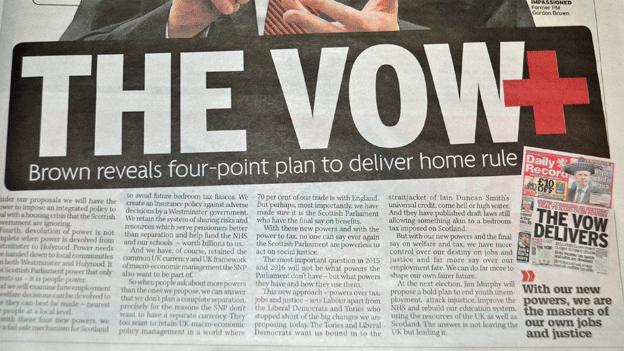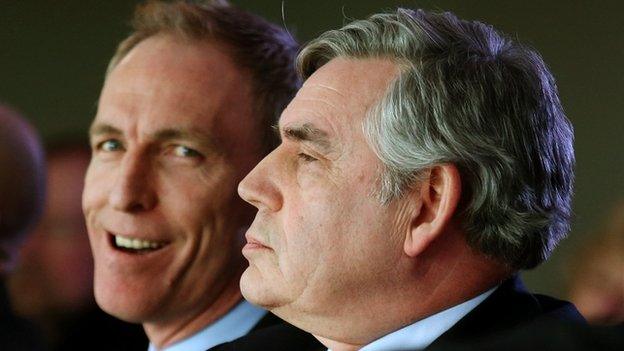Brown spells out 'vow plus' plan
- Published

Gordon Brown (pictured with Jim Murphy) talked about the Scottish Parliament topping up benefits
As ever, he spoke without notes, recalling compendious statistics with ease. As ever, he paced the stage like a caged lion, albeit one whose power was tamed by the electors some time back. As ever, he opened with a few funnies.
It was, then, a familiar performance from Gordon Brown - albeit with a distinctly calibrated message. Labour will be hoping for one other element to be repeated: for Mr Brown's oratory to deliver the success attributed to it during the referendum.
Be clear what has and has not happened. Labour is not arguing for the full-scale devolution of welfare. However, the emphasis has plainly changed.
During the referendum, Labour - and Gordon Brown, in particular - laid enormous stress upon the danger, as they saw it, of breaching the shared benefits structure of the United Kingdom.
To be fair, they are still doing so. But the underlying emphasis has changed.

Gordon Brown now talks of UK provision as a baseline, as a minimum. He talks of the Scottish Parliament topping up benefits - with the final say allocated to Holyrood. By contrast, it would not be feasible for Holyrood to cut benefits: the UK baseline would kick in.
There would also be the power to create new benefits, the full devolution of Housing Benefit (uncoupled from Universal Credit) and the transfer to local authorities of the Work Programme.
Arithmetically, there will be arguments surrounding all this about such minor matters as affordability and incentives.
But it is also intriguing politically. It is, we must presume, a further indication of Labour anxiety about the party's prospects in Scotland. How would it be otherwise, given apparent polling trends?
Today's initiative allows Labour to depict itself as riding point on key issues - in the interests of Scotland. It allows Labour, again, to project itself as representing the Scottish "patriotic" choice.
Scottish patriotism
By simultaneously arguing that the Smith Commission report falls somewhat short on benefits, it allows Labour to imply that it sustains a Scottish patriotism that is not necessarily universally shared.
In essence, it builds upon intrinsic criticisms of the Smith outcome and the draft clauses - which have, to date, mostly been evinced by the SNP.
By stressing Holyrood's final say, Labour is developing the SNP's claim that there was a UK veto on benefit changes: a change vigorously denied by the UK coalition.
In response, the SNP say the initiative is born of panic. Willie Rennie of the Liberal Democrats claims that Labour, within the Smith Commission, helped thwart attempts to secure substantial benefit devolution. He says Labour leaders are "making it up as they go along".
Naturally, both verdicts are contested by Labour. The party says it is deftly blending the advantages of the Union with devolved opportunities for Scotland.
Deploying triangulation, Jim Murphy says: "The Tories would not give Scotland the freedom on welfare we seek while the SNP would not protect the fundamental guarantees of the UK wide welfare state we need."
- Published2 February 2015
